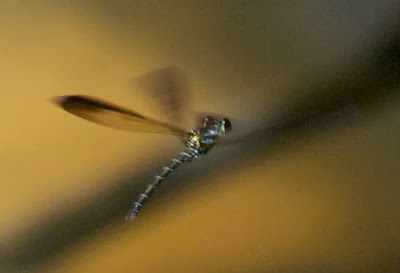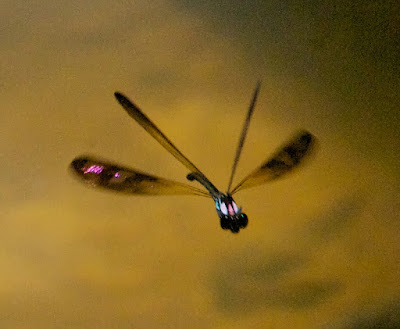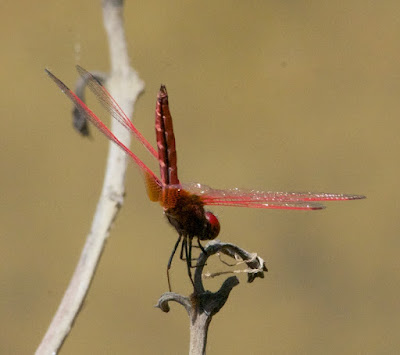While our grandson Royce continued his treatment in Singapore, diligently attended by Eileen and, alternately, his Mom or Dad, his brothers Ryan and Ryder risked being overlooked back home in Kuching. We therefore decided that I would be more useful in Sarawak, where I could drive Ryan to and from school. Little Ryder, Royce's baby brother, was being well cared for by Eileen's sister Ye Guak (Ellen; the kids call her Mai Mai [Auntie]). Mai Mai's home is out of town, near Matang, and on August 18, 2014, she took me out there to explore the little stream next to her house.
In her garden I found an assortment of common insects - butterflies such as this Brown Pansy (Junonia hedonia)...
...and two of the three common local species of the ubiquitous genus Neurothemis, the smaller N. fluctuans...
...and the larger Neurothemis terminata (note the different shape of the clear area on the hindwing).
Clear, shaded streams in Sarawak, including Mai Mai's, are the province of the short-bodied damselflies of the family Chlorocyphidae, generally known as Jewels. One chlorocyphid that certainly deserves that name 'jewel' is the common Heliocypha biseriata, whose females (top) are mostly black and yellowish but whose males (below) boast iridescent patches of amethyst and blue on their bodies and wings. The wing patches flash like signal lights in flight - and that is precisely what the males use them for.
Heliocypha biseriata males are highly territorial, defending short stretches of stream along fallen logs where the females lay their eggs. When a rival appears on the scene, the two males challenge each other in aerial contests during which they fly up and down while facing each other, flashing the iridescent wing patches on the undersides of their wings.
These jousts rarely last more than a minute or so (unlike the contests of some other chlorocyphid males, which can go on for more than half an hour).
Here's video of the jousting jewels in action.
Mai Mai, noting my interest in damselflies, offered to take me to another potential site not far away - a gravelly river in the Jubilee Mas Park (Taman Rekreasi Jubilee Mas).
I found nothing new here, but did enjoy seeing this Prodasineura verticalis, one of Sarawak's most attractive damselflies.
Heliocypha biseriata was here too; this is a female.
Streams with lots of emergent stones seem very attractive to Trithemis aurora...
...a dragonfly that is certainly beautiful, but that seems to take the habit many dragonflies have of assuming the so-called obelisk posture to an extreme. This one seems about to topple over itself.Clear, shaded streams in Sarawak, including Mai Mai's, are the province of the short-bodied damselflies of the family Chlorocyphidae, generally known as Jewels. One chlorocyphid that certainly deserves that name 'jewel' is the common Heliocypha biseriata, whose females (top) are mostly black and yellowish but whose males (below) boast iridescent patches of amethyst and blue on their bodies and wings. The wing patches flash like signal lights in flight - and that is precisely what the males use them for.
Heliocypha biseriata males are highly territorial, defending short stretches of stream along fallen logs where the females lay their eggs. When a rival appears on the scene, the two males challenge each other in aerial contests during which they fly up and down while facing each other, flashing the iridescent wing patches on the undersides of their wings.
These jousts rarely last more than a minute or so (unlike the contests of some other chlorocyphid males, which can go on for more than half an hour).
Mai Mai, noting my interest in damselflies, offered to take me to another potential site not far away - a gravelly river in the Jubilee Mas Park (Taman Rekreasi Jubilee Mas).
I found nothing new here, but did enjoy seeing this Prodasineura verticalis, one of Sarawak's most attractive damselflies.
Heliocypha biseriata was here too; this is a female.
Streams with lots of emergent stones seem very attractive to Trithemis aurora...





















No comments:
Post a Comment